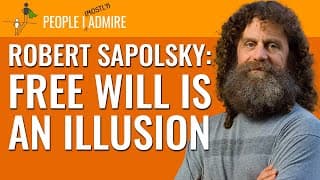🧵 View Thread
🧵 Thread (67 tweets)

I keep being asked to give an overview of memetics. I'll take a stab at it in thread form. 🧵👇 https://t.co/njQicovY7P

Memetics is a branch of science. It's VERY much like biology. Intuitively you can think of it as the scientific study of spirits and their ecosystems. But it doesn't require any woo. I say "spirits" as an intuition pump. It EXPLAINS "spirits" in scientific terms.

As a branch of science, memetics is hilariously underdeveloped. Some good analogies for where it's at: • zoology after Darwin but before Watson & Crick • epidemiology after Semmelweis but before microbe theory • chemistry in the 1700s as it struggled to stop being alchemy

If you smash a rock with a hammer, it just gets chipped or breaks. It sits there and does nothing. No protective adaptation to the incoming threat. Not biological. If you hit a moose with a hammer, though, you're going to have a bad day.

Likewise, I went to a particular restaurant a few days ago. If I were to decide not to go there again, it just wouldn't happen. But my attempts to stop scrolling social media spaces like this one encounter… resistance. The scrolling behavior adapts to threats to its survival.

I'll give more examples of memes in a bit. But the above example hints at a large family of them: addictions. https://t.co/HvV8vZtjJA

And yes, lots of addictions involve chemical dependency, like w/ getting hooked on caffeine. But that's just part of the medium, like biochemistry is key to how a cat hunts. The biochemistry matters but it's not what's interesting about the cat's behavior.

Likewise, the interesting bit about caffeine addiction is how it organizes intelligence to protect itself. How it produces plans, and rationalizations, and a culture of laughing about how hopelessly dependent many of us are on coffee or w/e.

Notice that I'm talking about the caffeine addiction as the agent here. The ADDICTION produces plans, rationalizations, etc. That's part of the point. We can view the addiction as having a survival instinct & some influence over its human host. It functions like a symbiont.

Memes generally work as symbionts. They exist through human minds, so they evolve ways of embedding in & transmitting between human minds. It's helpful to know a bit about symbiosis in biology. Memes follow many of the same patterns. https://t.co/3ewMWWZUag

Two of those patterns are (a) mutualism, where both parties benefit (b) parasitism, where one party benefits to the detriment of the other It's simplistic to say that a given meme is of one type or the other. But it's still helpful to notice when one pattern dominates.

Addictions are basically parasites. Sure, they usually offer some benefit. But often the benefit functions mostly as a way for the addiction to embed in the host. The energy boost from caffeine works only until adaptation, after which we need caffeine just to get back to normal.

By contrast, hand washing is mutualistic. We stay healthier by letting this meme live in us and transmit between us (e.g. by teaching our kids to wash their hands at certain times). It can acquire unhealthy mutations like OCD, but for the most part it's just helpful & good.

Addictions & hand washing are roughly the memetic equivalent of microbes. Much like cells can form ecosystems that we call "animals", small memes can form larger ecosystems that function as coherent wholes. In memetics proper, those ecosystems are called "memeplexes".

CP Grey gives a fantastic example type of a memetic ecosystem. Here he calls memes "mind germs". Given 10min to explain memes, I'd spend 7 of them playing this video. https://t.co/nS4gpLIX9z

For instance, today most liberal cities I visit have "Free Palestine" spray painted here & there. It's kind of strange if you think the words are meant to persuade someone. It makes way more sense if you think of it as an animal marking its territory.

On the inside, being a vessel for a memeplex usually doesn't feel like being a vessel. It usually feels like agreeing with a view, or having specific thoughts, or bonding with others you like &/or agree with. It's a subtle inclination to think & act in specific ways.

This hints at part of what I mean by "memetic literacy": can you notice memes in the wild? Can you observe them as they move through you? It's a way of perceiving, not a theory — much like reading is more of a skill than an idea.

For instance, "random" thoughts are never random. When a thought shows up unbidden & drives your behavior, chances are very good it's from a meme. What's that meme's survival strategy? By default many people don't even notice the THOUGHT let alone the underlying drive.

And if you don't address the meme's strategies, you cannot change the net behavior. You can at best change some of how the behavior happens. This is key to why so much psychological change can be difficult, even masquerading as though it has happened when it hasn't.

Wild animals are often riddled with parasites. Humans got free of it via hygiene & systemic sanitation. Memetically we're in a similar spot right now. Riddled with memetic parasites. We haven't yet worked out the NEED for memetic hygiene, let alone built infrastructure for it.

(Not to say there's none. Christian ideas around purity & avoiding the influence of the Devil come to mind. But right now memetic hygiene is on par with European health practices when they thought the Black Plague was carried by bad smells.) https://t.co/4s31VxZn63


Historically, many cultures have called these parasites "spirits" or "demons". An alcoholic struggling with his addiction can, to this day, feel like he's wrestling some foreign inner force for control of his life, his mind, and perhaps even his soul.

Quite a lot of shamanism and magic amounts to attempts at memetic engineering. Exorcizing spirits, putting up wards, etc. And some of it works! Much like ancient Romans could build aqueducts centuries before Newton invented the modern version of physics.

For instance, my view of attachment theory came from an explicitly shamanic attempt to heal my Torn style. And it helped a lot! The ritual made it possible for me to start dating again. https://t.co/sWROelt4L0

But thoughts are memetic. Ideas about mechanical engineering aren't subject to physics the way the idea of spirits is subject to memes. So without a precise science, shamanism risks becoming a vector for memetic parasites. ("You'll lose your soul if you dabble with magic.")

So you end up with some "self-hiding" spirits, and some spirits that insist we're not allowed to consider a spirit world at all. Wokism started insisting on not being named for instance. And scientific culture tends to insist that memes are "just a metaphor".

(Never mind that, say, an elephant is "just a metaphor" too. Unless scientific culture would like to argue that there's some ephemeral "essence of elephant" that's objectively real and yet independent of the physics & biochemistry constituting an elephant…?)

The name for memetics really should be "the study of spirits" in Greek. Like astronomy should be "the study of stars" if astrology hadn't gotten the name first. Likewise, memetics cannot really reclaim its rightful name from psychology.

For instance, archetypes are basically gravitational attractors in memetic evolution. When a meme is trying to find a viable form, some long-proven patterns (like "Mother" or "Warrior") can act as possible building blocks. Many of those patterns are thus "immortal" memes.

This starts to spell out what a "god" might be, for real. Some "unbidden" thoughts will arise archetypically. Thus, much like "Free Palestine" shows up through many people, so can (say) the Warrior — a FAR more ancient force than this young memetic upstart.

That said, IMO Jungian psychology tends to get lost in myth the same way shamanism & magic do. I don't mean to idolize it. I'm pointing out that the field of memetics has been trying to arise for a long time & has a LOT of overlap with both psychology & spirituality.

Eg, many memes operate through your implicit sense of self. Some memes are quite miserable to host, but "you" can't get rid of them b/c they're part of "you". So what do? That's a basic conundrum many religions orient to. Christian salvation, for instance, or Buddhist no-self.

I have hope that a mature science of memetics can do justice to spirituality & religion. The scientific memeplex had its teenage rebellion against the Church. Teens do that to individuate. But now maybe science can care for what the Church was calling "the human soul".

There's a lot more to say. Memetics is as huge as biology. The big diff for an overview is that folk already know what plants & animals are. I'm having to point at psychofauna AT ALL, w/o a clear taxonomy, while keeping it near science instead of it all becoming just mystical.

So I hope this has served well as a solid, if partial, intro. Feel free to ask me whatever about memes. I'm not The Authority™ on the topic, but I've thought about & studied memes explicitly for a good while. I'm happy to share my impressions. /fin

I first learned to view memes this way from this article by David Deutsch. I read it in 2018. It's defined a lot of my thinking since then. https://t.co/gKMZCVGDpu

There used to be an academic field of memetics. It died in 2005 due to inability to agree on what a meme is or how to do empirical research. It seems to me that they were too fixated on memes as analogous to GENES instead of to ORGANISMS. https://t.co/oG8KfmRMYI

I pivoted my blog away from JUST magic (Hermeticism) & more toward memetics. As of now there's just one post in the main section. It's a slightly different intro to memetics. It's on The Banned Site, so either check my profile or go to morphenius dot <bannedsite> dot com.

In occultism, memes (especially memeplexes) are often called "egregores". https://t.co/uKmnbKQ9Uv

Timothy Morton intro'd the idea of hyperobjects. If hyperobjects exist, then evolution should create hypercreatures too. That's another angle for thinking about what memes are. https://t.co/T0WPAOoMwt

I made a case years ago that AI risk is the end of a memetic process. We're not just preparing for some superhuman intelligence; we're already dealing with several. I still think this is true. https://t.co/pw9eGzMtY3

@sterespect I'm in fact working on basically that! For a while I called some antimemes "distraction programs". I think I now have a more coherent theory for how at least some of them work & how to dissolve the problematic ones. https://t.co/vGCBUnAkoj

@Murali_Thoppil A culture is usually a memeplex. Communism is also a memeplex but it'd be a little odd to call it a culture. https://t.co/49GdRtgXkf

@Morphenius These ideas are not unfamiliar to me. Most commonly they're known about religion. But some of this way of thinking will produce the wrong intuitions, as memes of course don't actually have any agency, they don't actually do anything. It shouldn't be taken too far.

@MindMechanical I don't understand this objection. It happens every now & again, always matter-of-fact. When I point out how the same logic suggests NOTHING has agency, I hear crickets. No counterargument. Just… no reply. Would you care to offer the first? https://t.co/hjKxXpV7AZ

(Never mind that, say, an elephant is "just a metaphor" too. Unless scientific culture would like to argue that there's some ephemeral "essence of elephant" that's objectively real and yet independent of the physics & biochemistry constituting an elephant…?)

@Morphenius You seem a bit frustrated, but I hope we can proceed in a cordial fashion. Happy to offer my arguments on the matter. You strike me as a systematic thinker, so I'll assume you'll appreciate a comprehensive (long) answer.

@Morphenius I would define agency as something having a goal, instead of just "tending towards something in an evolutionary sense, meaning, the generations that do more of the tending propagate more". Something that can redirect its course within the same generation, let's say.

@Morphenius So I would say this definition does fairly neatly cleave the cognitive space into things that can have agency and things that can't. In a similar way I would not say that genes have agency, even though they can be talked about as having goals like survival, for simplification.

@MindMechanical Thank you. You're right, I'm readily frustrated right here. But it's due to what I've experienced as others' disinterest in going beyond casual dismissal. I wish I were more skilled in kindness here. But in the meantime: thank you for engaging in good faith.

@Morphenius @MindMechanical i've read and listened to takes on similar arguments before, such as from this guy and they often seem to come from the angle - "therefore we need to rethink moral responsibility and punishment" https://t.co/18x3cTae7J


@Morphenius Beautiful thread! Things likes self-dislike, paranoia, anxiety seem to me examples of facultative parasitism that feel like parasites but overall produce better pure utilitarian measurable results. (e.g. self-dislike -> higher total volume of corporate salaried paychecks)